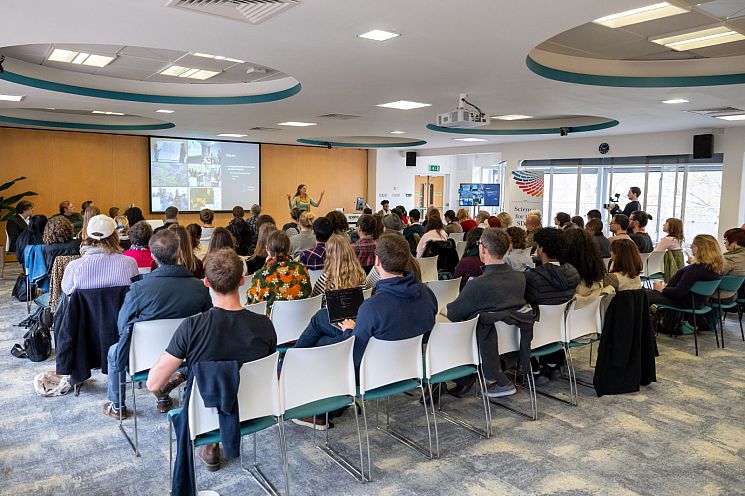SSRP Symposium summary: Driving positive change for people and planet
By: Edwin Gilson
Last updated: Thursday, 13 February 2025
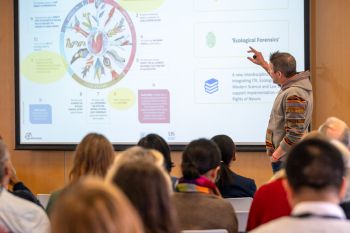
Professor Mika Peck presents at the Symposium
Coinciding with the all-important COP29 conference in Baku, Azerbaijan, the Sussex Sustainability Research Programme (SSRP) Symposium 2024 showcased sustainability research that is making real, positive change around the world.
About 100 attendees from within and outside the University of Sussex enjoyed insightful short presentations on wide-ranging research based everywhere from the South Coast of the UK to South America, the Horn of Africa to Papua New Guinea.
The programme was split into three parts, corresponding to key SSRP themes: Ecosystems, Rights and Justice; Sustainability Frontiers and South Coast Sustainability; and Sustainable Climate and Food Systems.
Introducing the Symposium, SSRP Director Professor Joseph Alcamo emphasised the importance of research and collective action in a world marked by conflict and division. Indeed, the role of local people and communities, as a central component of academic research, was a recurring trope throughout the event.
In his introduction, Professor Keith Jones, Pro-Vice-Chancellor (Research and Innovation), contextualized the Symposium, pointing out that the United States has just reelected a President who once promised to ‘drill, baby, drill’.
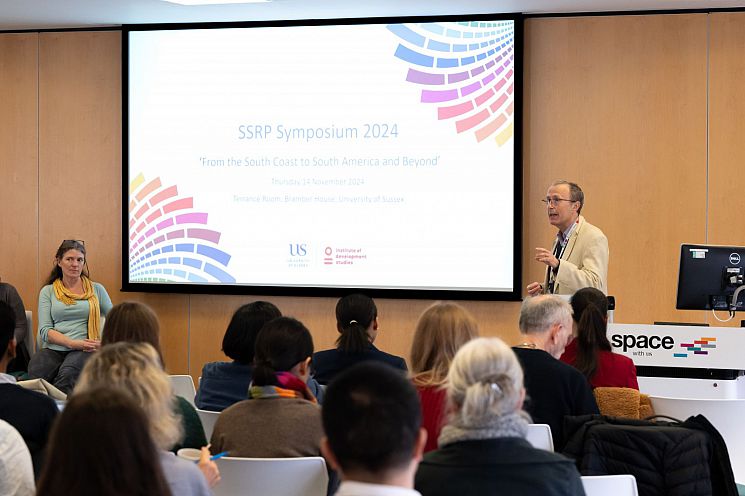
Professor Keith Jones, Pro-Vice-Chancellor (Research and Innovation) introduces the Symposium
Against this policy backdrop, and with successive COPs failing to deliver effective plans to limit planetary heating, numerous attendees of the Symposium said they appreciated the opportunity to learn about forms of mitigation against, and solutions to, the climate and ecological crises.
The first panel – consisting of Professor Fiona Mathews (Life Sciences), Professor Mika Peck (Life Sciences), Dr Perpetua Kirby (Education and Social Work), Dr Emanuela Orlando (Law, Politics and Sociology), Dr Alex Shankland (Institute of Development Studies) and Jo Middleton (Brighton and Sussex Medical School) – was primarily focused on the intersection between global environmental change and the legal rights of humans and nature.
Professor Mathews, whose research was recently covered by the BBC, discussed her work around forest restoration and territorial rights in the Andean Bear Corridor, Ecuador. She explored the conflicts and synergies between land titles for local populations and ‘rights of nature’, and outlined next steps for the project, including: expanding the network for remote observations of animals, monitoring the interactions of bears and other wildlife and people, and ‘ground-truthing’ remotely-sensed data – meaning, in this case, using direct observation to confirm the accuracy of digital deforestation mapping.
Next, Professor Mika Peck talked about his collaboration with a team of ‘paraecologists’ in Ecuador, who are assessing biodiversity levels to support ‘rights of nature’ cases, which aim to ensure legal protections for natural sites. This work builds on a landmark ruling which saw Ecuador’s Los Cedros Forest granted legal rights in 2021, a campaign which Professor Peck contributed to. In his presentation, he revealed that several native species believed to have gone extinct in the mountainous Intag area – such as the jaguar and the Longnose Harlequin Frog – have been detected by the project’s camera traps in recent years.
Dr Kirby then explained how she and Sussex colleagues, with international partners, have developed a prototype of an in-person table-top storytelling game to educate and engage children and young people in sustainability challenges. In the game, local decisions influence global issues and alter the state of the world, encouraging participants to imagine responsible presents and alternative futures. Looking forward, the Sussex team will test the game with groups of young people across the globe.
Attendees then heard from Dr Orlando whose research looks at the drivers of deforestation from a legal perspective, finding ways to achieve sustainable supply chains through due diligence, regulation and management. Currently, Dr Orlando and colleagues are looking at ways to frame the relationship between producers and consumer countries, and exploring the link between efforts to halt deforestation and policies to protect human rights in producer countries.
Completing this first part were Dr Shankland and Jo Middleton, the former of whom presented insights into his work for the territorial rights of traditional peoples in Minas Gerais, Brazil, in the face of extractive industries and agribusiness. Collaborating with Sussex colleagues, Dr Shankland has found that legal frameworks for community and nature rights in other geographical contexts – including Scotland, South Africa and Colombia – can point the way towards reimagining territorial rights.
Lastly, Jo Middleton shared the latest progressions of a project at the intersections of biodiversity, human health, and climate action in Oceania. Jo explained how trainees from across Melanesia (Vanuatu, Solomon Islands, Bougainville, and mainland Papua New Guinea) will attend courses at New Guinea Binatang Research Centre in PNG to gain skills in biodiversity and health research and conservation management.
During the following panel discussion, presenters answered questions from the audience, which included undergraduate and postgraduate students as well as academic and professional services staff. Questions covered topics such as the role of carbon markets and local and national governments.
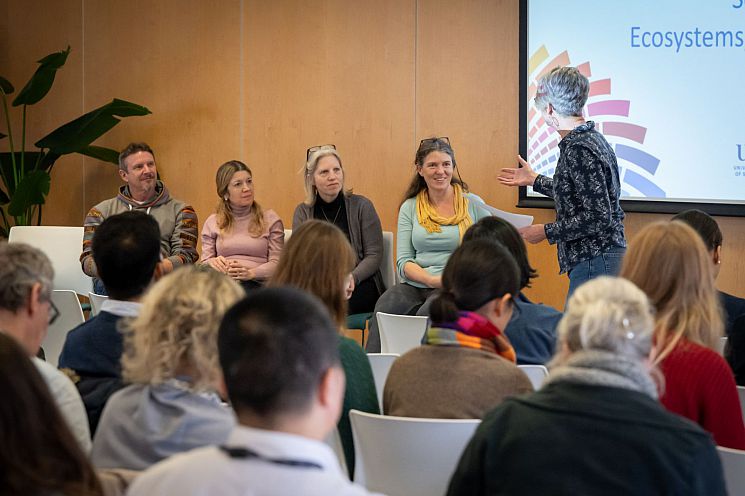
L-R: Professor Mika Peck, Dr Emanuela Orlando, Dr Perpetua Kirby, Professor Fiona Mathews and Dr Rebecca Webb
After a short coffee and networking break, the second part commenced with Dr Lucila Newell’s (Global Studies) overview of her Ripple Effect project, which was also recently covered by BBC News. She explained how citizen science – trained volunteers – has been instrumental in assessing river pollution in the Upper River Medway. Her team has identified the impacts of sewage outflows on aquatic life in the river and found levels of ammonia and phosphates in these areas are far above water quality norms.
Staying on South Coast waterways – and another project that received national press – Dr Valentina Scarponi (Life Sciences) then outlined how eDNA (DNA shed by different species in the water) has allowed her team to assess the recovery of biodiversity off the Sussex coast since a trawling was prohibited in 2021. Dr Scarponi concluded by reminding us that these recovery patterns are not always predictable, and that science does not follow straight lines. As such, the number and variety of species located by the team’s baited remote underwater video technology (BRUVs) has fluctuated in the three years since the project launched.
Dr Mirela Barbu (Business School) then gave the first of two presentations on sustainable agriculture in Northwest Syria (the second was due to be presented by Professor Natalia Slutskaya, but she unfortunately had to pull out due to other commitments).
Dr Barbu’s first talk provided context on her Agricultural Voices Syria (AVS) project, in which she and collaborators from Sussex and the NGO Syria Academic Expertise created podcasts providing agricultural advice to farmers in Northwest Syria amid civil war. Her second gave a geopolitical overview of Syria and introduced a recently established agricultural centre in the same region, which will enable agricultural experts to experiment with different techniques and growing methods.
Dr Chi Eziefula (Brighton and Sussex Medical School) then talked about her interdisciplinary research network ‘Luna Connection’, which makes use of citizen science in the UK, Uganda, Kenya and Sudan to strive towards better and more sustainable menstrual health. Dr Eziefula and partners are now focusing on menstrual health education in schools.
Concluding this part of the Symposium was Dr Qingxiu Bu (Law, Politics and Sociology), who discussed his collaborations with the United Nations Development Programme and various universities around the world in the field of environmental and social governance (ESG). In this presentation, Dr Bu talked specifically about his work around waste management and resource efficiency in South Africa and Lesotho.
The panel discussion that followed centered on the concept of citizen science, which is at the heart of most of the panelists’ projects.
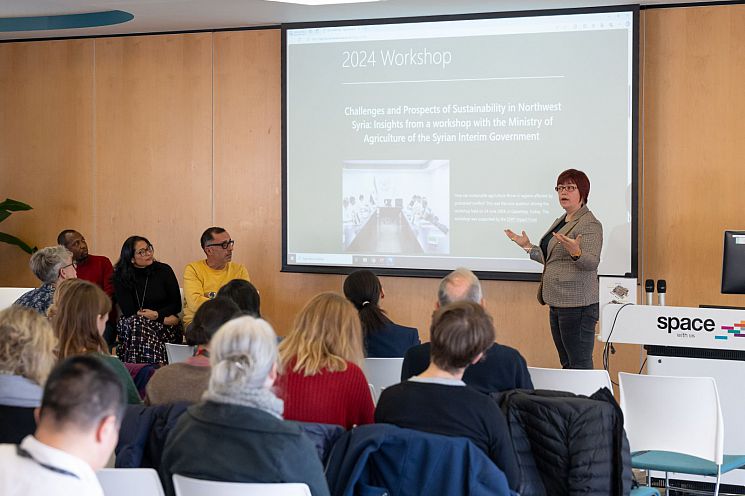
Dr Mirela Barbu presents as panelists Dr Abdul Abbas (left), Dr Shova Thapa Karki and Dr Pedram Rowhani look on
The final part of the Symposium revolved around sustainable climate and food systems. First, Dr Shova Thapa Karki (Business School) reflected on her project investigating the gap between sustainability actions based on top-down knowledge with a global perspective and bottom-up, place-based knowledge, focusing particularly on issues of food production and consumption systems.
For place-based knowledge she and colleagues used examples from Sussex and Java, Indonesia respectively. After carrying out focus groups with various stakeholders in both locations, Dr Thapa Karki’s next steps include pinpointing the characteristics of place-based knowledge in the context of local food production, preparation and consumption. She will then examine how this knowledge influences participants’ understandings of expert, top-down guidance.
Dr Pedram Rowhani (Global Studies) then gave an overview of his work around people-centered systems to warn pastoralists of drought in the Greater Horn of Africa. He and colleagues have found that early warnings will not be trusted unless they are tuned to the perspectives of people on the ground. Dr Rowhani also highlighted the goal announced by UN Secretary General António Guterres that by 2027 everyone in the world should be covered by an early warning system against extreme weather events.
The final presentation of the day also focused on research based in Africa. Dr Abdulrafiu Abbas talked about research and innovation policy for climate change and sustainability in Northern Nigeria, looking at ways to – again – involve local people (as well as academics and governments) in technological and social innovation and sustainability initiatives. Dr Abbas and colleagues have formulated strategies for implementing climate-smart and socially-inclusive projects in local communities.
Questions about the role of gender in climate policy and action, and the meaning of place’ were raised in the panel discussion.
The Symposium was rounded off with a screening of the beautifully-shot short film ‘Voices of the Paraecologists’, introduced by Professor Mika Peck, which documents the activity of volunteers collecting biodiversity data in Ecuador. Stimulating discussions between presenters and audience members carried over into lunch.
SSRP would like to thank everybody who attended and contributed to the Symposium for making it a thoroughly enjoyable and thought-provoking event. While the global picture remains precarious, the Symposium underlined the importance of research in driving positive change for people and planet.
